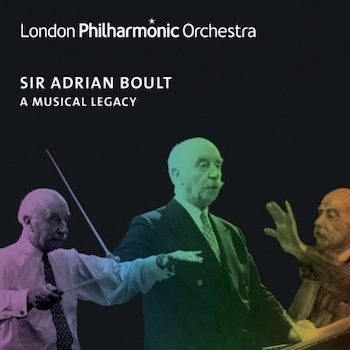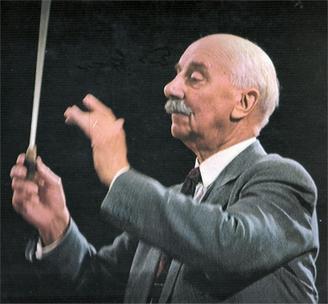Classical Album Review: “Adrian Boult: A Musical Legacy” — Introduction to a Special Conductor
By Jonathan Blumhofer
Sir Adrian Boult certainly had his ups and downs as a conductor, but these performances showcase him largely at his best.
 Few conductors led longer – or better-documented – careers than Sir Adrian Boult. Born in 1889, Boult conducted his first professional concert in 1914; the last was in 1978, five years before his death at the age of ninety-three. Much of the last third of Boult’s life was spent in association with the London Philharmonic Orchestra (LPO) and that orchestra has a five-disc compilation of recordings (out late last year) to commemorate the seventieth anniversary of Boult’s appointment as the ensemble’s chief conductor in 1950.
Few conductors led longer – or better-documented – careers than Sir Adrian Boult. Born in 1889, Boult conducted his first professional concert in 1914; the last was in 1978, five years before his death at the age of ninety-three. Much of the last third of Boult’s life was spent in association with the London Philharmonic Orchestra (LPO) and that orchestra has a five-disc compilation of recordings (out late last year) to commemorate the seventieth anniversary of Boult’s appointment as the ensemble’s chief conductor in 1950.
This is a generous survey: all five CDs are amply stocked (the shortest, the ballet-centric Volume 3, runs a substantial sixty-nine minutes) and not just with pieces by the usual suspects.
That said, there’s no shortage of Boult standards. Volume 1, for instance, pairs Edward Elgar’s Symphony no. 1 and Ralph Vaughan Williams’ Symphony no. 6. This is the first of Boult’s three LPO Elgar Firsts, from 1949, and, interpretively, everything comes off impressively: tempos are natural, phrasings flexible, there’s a strong sense of shape to the proceedings, and – most importantly – the conductor doesn’t underline anything too heavily or obviously.
The Vaughan Williams Sixth that follows is, likewise, compellingly directed. Recorded in the composer’s presence in 1953, this is perhaps as definitive a VW Six as they come, played to the hilt (the first movement’s harrowing opening section is brilliantly done) and never lacking for focus or color (see the flawlessly-executed finale).
Boult’s spacious 1957 account of Beethoven’s Eroica Symphony anchors Volume 2, which is balanced by a highly characterful account of Ernö von Dohnányi’s Variations on a Nursery Tune, and a fervent performance of Max Bruch’s Kol Nidrei. Patricia Bishop’s delivery of the involved piano part in the former (taped live in 1955) is glittering and agile, while cellist Christopher Bunting (in 1967) proves a fervent advocate for the latter.
Volume 3 is given over to ballet music, most prominently fresh, stylish accounts of excerpts from Léo Delibes’ Sylvia, Naïla, and Coppélia (the LPO brasses are particularly impressive in their fanfares during the “Prélude et les Chasseresses” from Sylvia). Rounding out this disc is a bold account of the “Ritual Fire Dance” from Manuel de Falla’s El amor brujo; a shapely, driven Danse macabre; a jaunty take on Stravinsky’s raucous Circus Polka; and – best of all – the rarely-played ballet from Boult’s friend Gustav Holst’s opera The Perfect Fool.
The latter set of installments consist of miscellany, some substantial (a focused 1955 account of Bartók’s Music for Strings, Percussion, and Celesta), some less so (a stately reading of Jeremiah Clarke’s short “Prince of Denmark’s March”). Both of those turn up on disc four, which also includes some athletic Walton (the Portsmouth Point Overture), driving Sibelius (“Lemminkäinen’s Return”), and an exuberant take on Gershwin’s Cuban Overture (recorded in 1968, when Boult was seventy-nine!).

Sir Adrian Boult — musicianship of a very high degree. Photo: Wiki Common
The final volume stands as a celebration of music from the British Isles. There’s a characterful 1955 performance of Stanford’s Songs of the Fleet as well as an abridged (though lustily-played) run-through of Elgar’s In the South. Most intriguing is the inclusion of Malcolm Arnold’s Organ Concerto – an ingratiating one, if ever there was, highlighted by a gorgeous, songful slow movement – and Arnold Bax’s Debussy-like The Garden of Fand.
Perhaps unsurprisingly, given the twenty-year span of these recordings (the 1949 Elgar Symphony no. 1 is the earliest; George Butterworth’s A Shropshire Lad, in a beautifully-executed reading, from 1969, the most recent), there’s some variety to the sound quality, performance-to-performance.
In general, the set’s symphonies have been well-remastered: some claustrophobic climactic moments in the Elgar notwithstanding, the rhythmic and textural clarity of the LPO’s playing comes across clearly in all three of them. So, too, on the disc of ballet excerpts and most of the tapings from the ‘60s (excepting a canned acoustic on the Bax and surprisingly shoddy engineering on the Butterworth).
The remainder of the tapings from the ‘50s range from sonically acceptable for the period (Sibelius, Walton) to less-than-ideal. That’s most true, unfortunately, of the selections from Boult’s 1955 Royal Festival Hall concert (Dohnányi, Bartók, Stanford, Elgar’s In the South), which are marred by distracting audience noise and, in the case of the Dohnányi, really muffled instrumental sonorities.
That said, what comes over in all of these performances – regardless of the quality of audio transfer – is musicianship of a very high degree. Boult certainly had his ups and downs as a conductor, but these performances showcase him largely at his best. The musical line is always at the forefront of the present interpretations. The orchestral playing is rhythmically precise but phrasing is supple and never rigid. Tempos are, on the whole, well-judged. The LPO’s playing is, as a result, natural, characterful, and dynamic.
Given the sheer breadth of Boult’s discography, this set is by no means a definitive representation of his work. But it provides a wonderful introduction to his long collaboration with the LPO and gives a terrific sense of what made him so special as a conductor.
Jonathan Blumhofer is a composer and violist who has been active in the greater Boston area since 2004. His music has received numerous awards and been performed by various ensembles, including the American Composers Orchestra, Kiev Philharmonic, Camerata Chicago, Xanthos Ensemble, and Juventas New Music Group. Since receiving his doctorate from Boston University in 2010, Jon has taught at Clark University, Worcester Polytechnic Institute, and online for the University of Phoenix, in addition to writing music criticism for the Worcester Telegram & Gazette.
Tagged: Adrian Boult, Adrian Boult: A Musical Legacy
